- Livingstone potato (Plectranthus) on the menu in Burundi. Yeah but what does it taste like?
- The world’s roads mapped. About time too.
- The world’s convenience food made better. Maybe.
- Dog cooking pot from ancient China. Woof. Via.
- Hybrid rice backfires. Via.
- Mapping the impacts of climate change. Only country level though.
- Native lawns better. But are they greener?
- JSTOR does a cassava roundup despite hating tapioca.
- Biodiversity monitoring? There’s an app for that.
- Wild rice (not a wild relative of rice, mind, but sacred to the local Native Americans) vs the copper-nickel mining industry.
- Slideshow on rice (the real thing) in Vietnam.
Nibbles: Weeds, Maple, Striga, Wheat rust, Quinoa
- It’s that time again. National Public Radio eats weeds and other wild foods.
- It’s that time again. The complexity of Maple Syrups (but no mention of variety).
- It’s that time again. Mainstream media get hold of Striga control story.
- It’s that time again. Wheat fungus love from The New York Times to our friends at ICARDA.
- It’s that time again. Is quinoa kosher?
Nibbles: Wheat rust, Mill, Cassava
- A big-deal wheat rust conference started today at ICARDA in Aleppo, and there are various webby ways to keep in touch, like RSS (pointless?) and Twitter.
- Stop Press: Wheat rust presentations now on SlideShare.
- A windmill in south London. Jeremy says, “I hope it grinds slow, but exceeding fine.”
- Cassava!
Nibbles: Languages, Bats, Climate change, Bioinformatics, Wild Garlic
- Bioinformatics techniques applied to languages.
- Bats are agrobiodiversity too.
- “Biodiversity is under severe threat from climate change, but we need to be careful that we don’t give a false impression of what our confidence is.” Attribution to climate change easy at global level; at local, not so much.
- Problems with bioinformatics? BioStar is a site for asking, answering and discussing bioinformatics questions.
- A wild garlic festival in Wales this Saturday.
UG99 resistant varieties
In case you’re not following the discussion here on knowledge management, here’s a map of the wheat varieties resistant to UG99.

If you use Google to search for images of “UG99 resistance” it is right up there, near the top, and several versions are available…